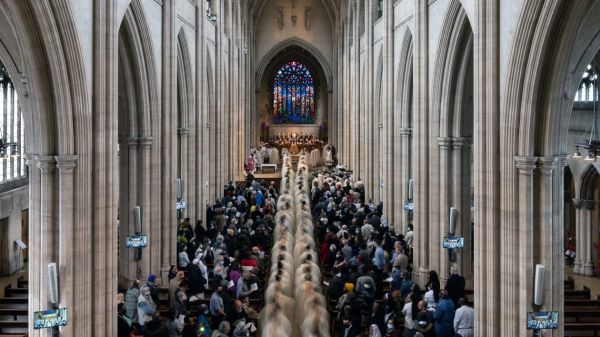The diocesan synodal reports for England and Wales show a “huge demand” for reform which has been “watered down” in the national synthesis according to the Root and Branch movement.
The lay-led initiative has undertaken a content analysis of all 22 diocesan syntheses prepared by the Church in England and Wales. According to its spokesperson, Penelope Middelboe, the analysis has identified “some glaring discrepancies” between the content of the diocesan reports and the national synthesis which she said is “much less vocal on reform”. However, she acknowledged that it was “more radical than we expected”.
“The way the national synthesis has been written up does not reflect the facts as supplied by the 22 diocesan syntheses. It diminishes key aspects,” she said.
The bishops’ reflection which was prepared in response to the national synthesis was “very disappointing” Middelboe said as it “kicked most of the demands for reform into the long grass”.
Middelboe, who is editor of the podcast series History Café, told The Tablet that the most “glaring discrepancies” shown up by Root & Branch’s content analysis of the diocesan reports and what was published in the national synthesis relate to women’s ordination.
This, she said, was “dismissed as less important than looking at women’s other gifts even though our content analysis of diocesan syntheses shows that 91% of reports are calling for [ordination]”.
Ordaining women to the priesthood and diaconate is not mentioned at all in the bishops’ reflection.
“Do we deduce that the bishops are reflecting that the synodal process was never intended, for example, to discuss ordaining married people or women?” Ms Middelboe asked.
Another discrepancy related to the “failure to engage with a call for genuine co-responsibility and the sharing of authority in the Church at the top level”. This was, she said, “relegated to parish level”.
She said it was “inevitable” that some filtering occurred in the preparation of the national synthesis by the nine-strong team who oversaw it. She noted that the small team contrasted to the much larger teams of approximately 600 involved in drafting the national syntheses in France and in Spain.
“The English and Welsh national synthesis was drawn up behind closed doors. It was written, working under the oversight of an archbishop and a bishop, by a lecturer at Oscott seminary, three diocesan employees, three employed by the bishops’ conference, including its general secretary, Austen Ivereigh who is Pope Francis’s biographer, and Kate Wilkinson, a school chaplain.”
According to Root & Branch, while some of the more radical and challenging aspects of people’s calls for reform have been noted in the national synthesis, this is done in such a way as “to deflect the reader from seeking to challenge or to hope for more”.
“Conversely those areas that align with the traditional teachings and the priorities of the Church are given glowing and effusive coverage,” she said.
Though the bishops’ reflection does refer to the need to reach out to minority groups, Root & Branch members say insufficient emphasis is given to clerical abuse while women are mentioned only in passing either as lay catechists, acolytes or lectors, or as having valuable gifts for renewing the missionary dynamism of the Church at local level.
According to Root & Branch’s analysis of the England and Wales reports, more than three quarters of the diocesan syntheses called for married priests, and for better inclusion in the Church for those with disabilities, and those of other ethnicities.
The analysis shows that 86% called for a shift from Church teaching expressed as rules towards ways of thinking, and 91% demanded women be ordained. 95% called for more ecumenism and for what occurs in the Church to be discussed and agreed by all. The same proportion called for Church leaders to be accountable and for reform of canon law.
Every single diocese called for more inclusion of LGBTQ+ Catholics and transparent systems of safeguarding, auditing and scrutiny.
“The English and Welsh laity are demanding radical change with a remarkably united voice,” said Ms Middelboe.
In 2021, Root & Branch proposed the “Bristol Text” as a basis for discussion about reform in the Church. It emerged from working groups of theologians, clergy and distinguished laity, both in the Catholic Church and outside, in Britain and around the world.
According to the lay-led Catholic forum, “the content analysis of the 22 diocesan synodal returns of England and Wales, show that the English and Welsh laity are calling for precisely the kind of reforms set out in the Bristol Text”.
Another member of the Root & Branch movement, Maggie Conway, told The Tablet that rather than “embrace bravely the voices and pleas from the revelations of the 22 Diocesan syntheses,” the national synthesis “is a mixed bag”.
“Although some of the more radical and challenging aspects of the revelations have been noted, those areas that align with the traditional teachings and the priorities of the Church are given greater coverage.”
Nowhere in the national synthesis is the methodology disclosed or any details provided, Ms Conway underlined.
The only insights on methodology are gleaned from an article by Austen Ivereigh in a recent issue of The Tablet, in which the methodology was described as a light touch process with “a general methodology and thematic structure”.
“In my view the content analysis Root & Branch produced shows the greatest discrepancies between the report and moral theology, Church authority, and clerical abuse however there are discrepancies across all areas,” Ms Conway said.
On the question of whether the bishops, in their reflection, are indicating that the synodal process was never intended to discuss ordaining married people or women, she commented: “If so, we need to make our resistance felt.”
She suggested that Catholics in England and Wales should look to “the 60 bold delegates at the Australian Plenary who stood silently in protest when the bishops decided not to vote on the motion calling for consideration of women’s ministry as deacons, and appropriate representation for women in Church governance”.
“The bishops listened and their final, toned-down document tentatively states that they will work to implement women deacons if the Universal Church votes in favour,” she said. “If this is what it takes to get bishops to listen it will not do for us to give them the benefit of the doubt now and politely wait and see.”
The national synthesis, accompanied by the bishops’ reflection, has been submitted to Rome and in September a meeting in the Vatican will begin the European continental synodal phase.



 Loading ...
Loading ...